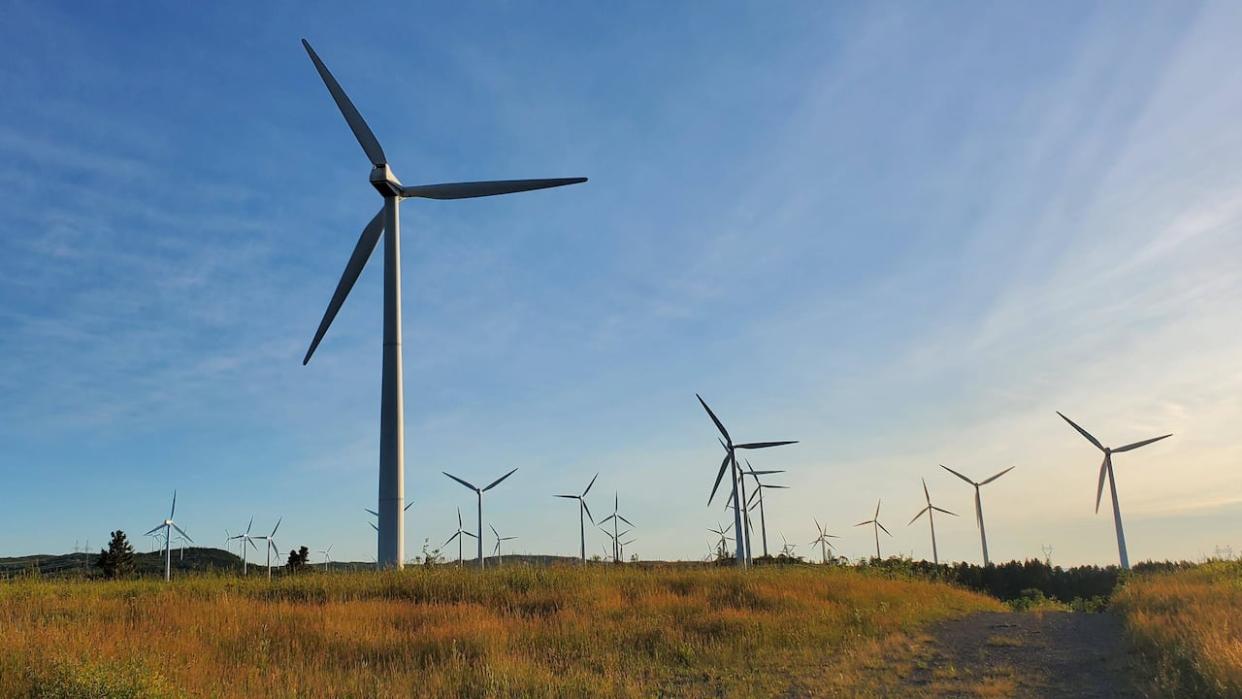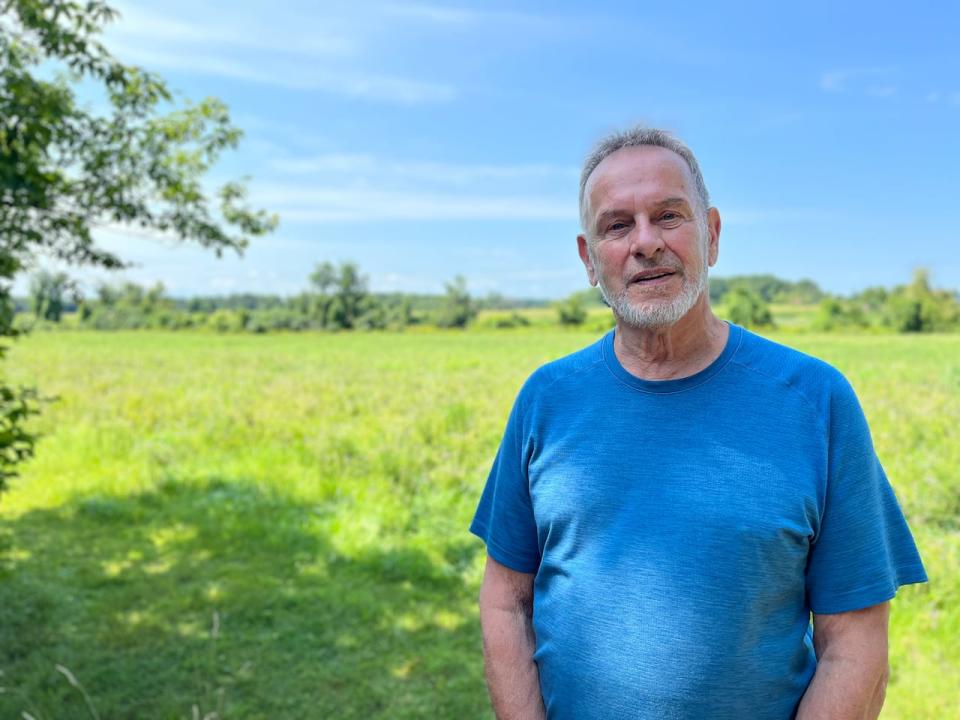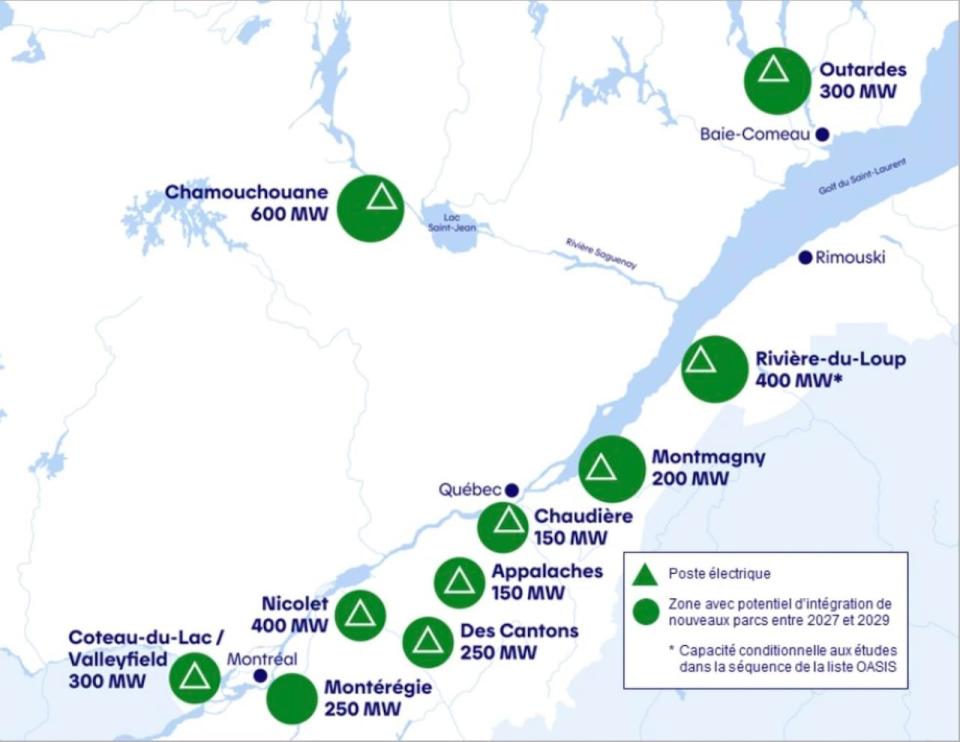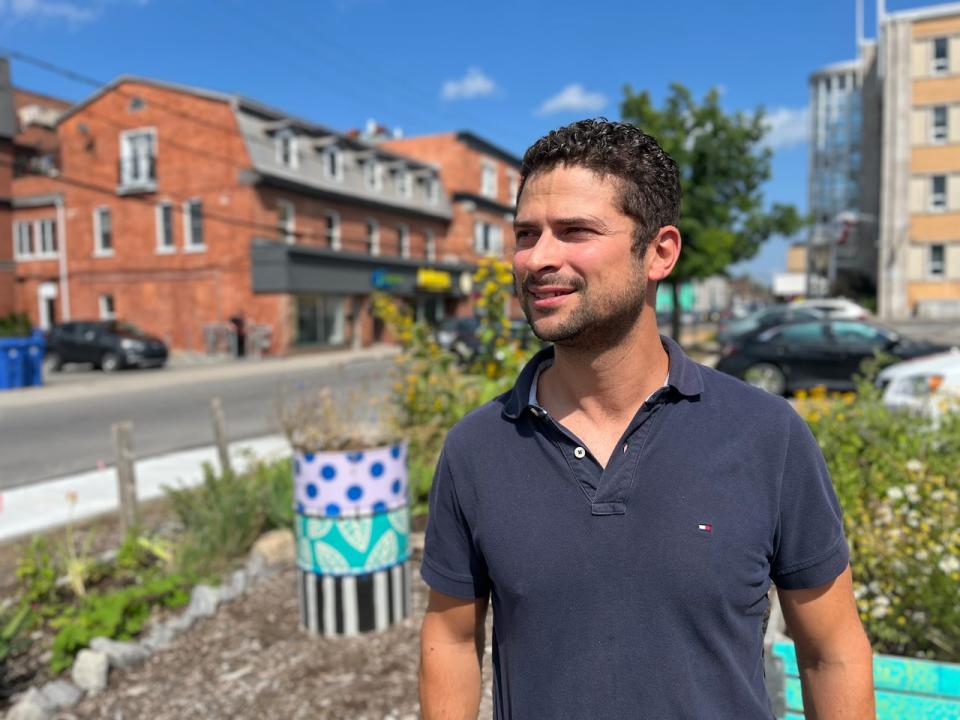Hydro-Québec's race for more wind power leaves developers scrambling, residents upset

Earlier this summer, Claude H. Vallée received an invitation in the mail to an information session about a project involving 12 to 15 wind turbines proposed near his home in Salaberry-de-Valleyfield, Que., in the Montérégie region.
Worried about his beloved landscape, one "without any wires or visual nuisance," Vallée attended the session on July 6.
He was shocked to learn that Hydroméga, a clean energy developer, had been in talks with the city since April and had already reached agreements in principle with farmers to host the 205-metre-tall turbines in their fields.
"We seem to have been warned too late," the resident said.

Claude H. Vallée, a resident of Salaberry-de-Valleyfield, says the wind turbine project slated for his region threatens to sully the landscape near his home. (Thomas Gerbet/Radio-Canada)
Hydro-Québec issued a call for tenders on March 31 for a total of 1,500 megawatts of electricity generated from wind power to help the province meet its long-term energy needs
The deadline for submissions is Sept. 12.
In an interview last week, Miguel Lemieux, the mayor of Salaberry-de-Valleyfield, said he still has many unanswered questions about the project planned for his region.
"The deadlines for submitting bids are very, very, very tight," he said. "This gives us very little time to respond to the questions and concerns raised by citizens."
In an ideal world, Lemieux said, the city would have taken a lot more time to familiarize itself with the project, and also to better inform citizens of the plans.
'We're aware that we're rushing things'
Hydroméga says it too feels rushed by the deadline.
"We have this urgency to move quickly," said Cédric Lascombe, vice-president of development and investment. "We're aware that we're rushing things [...] and that it can be unpleasant for the people in the area."
Lascombe describes the process as a "sprint," since the call for tenders was announced not six months ago.

Cédric Lascombe, vice-président of development and investment at Hydroméga, describes the process of submitting their project as a 'sprint.' (Thomas Gerbet/Radio-Canada)
He said in that short time period, promoters needed to carry out wind measurements, map out the installation sites for the turbines and their connections, carry out environmental impact studies and review local regulations.
"Historically, these are the shortest deadlines we've ever had in Quebec for responding to a call for tenders," he said.
The promoters must also show that they've informed citizens of the project, answered their questions and obtained the official support of the communities concerned, including towns, regional county municipalities and Indigenous communities.
"If we had two more months, we'd have time to ensure social acceptability and to present the project in much better detail. I think that would reassure everyone," said Lascombe.

Hydro-Québec designated 10 zones (the green circles) around exiting power stations (white triangles) that could integrate other forms of power production. (Hydro-Québec)
Race against the clock
Last year, the Quebec government revealed that the province risks facing a power shortage in the next few years. Hydro-Québec anticipates the end of its surplus as early as 2027.
Quebec's minister of economy and energy, Pierre Fitzgibbon, said last year that the province would have to start considering "massive" wind power projects.
"The decarbonization of the Quebec economy is driving significant growth in anticipated demand for clean electricity," said Maxence Huard-Lefebvre, a spokesperson for Hydro-Québec.
"The timetable for the call for tenders is designed to meet this demand, with commissioning as early as 2027."
He said the public utility believes its schedule is realistic, but says if developers can't submit their projects on time, "there will be other opportunities to do so in the near future."
There are currently 2,212 wind turbines operating in the province, but with all the projects in the pipeline, that number should rise to 3,000 by 2030, according to Radio-Canada.
The new turbines are larger and generate more power. Hydro-Québec expects to double the electricity generated by wind turbines in 2030, and quadruple it by 2040.
'It's a bit like the Wild West out there'
In the Nicolet-Yamaska Regional County Municipality, elected officials deemed the deadlines "too short" to analyze a wind turbine project by Sept. 12. It ultimately passed on the opportunity submit a project.
"We don't have enough time to inform the public, to work collectively with municipal councils and the advisory committee," reads a news release from the region in July.
"Above all, the deadlines are too short to define all the conditions, such as appropriate and safe regulations."
Some municipalities say they're being approached by two or three wind farm developers at the same time. Several elected officials have called on the Fédération québécoise des municipalités (FQM) to help them make an informed decision quickly.
"It's a bit like the Wild West out there," said Michel Lagacé, chairman of the FQM's standing committee on energy and natural resources and mayor of Saint-Cyprien in the Rivière-du-Loup Regional County Municipality, which is already involved in a wind power project.
Lagacé said municipalities and promoters should have been given at least a year to submit their bids.
"It's clear that deadlines bring incredible pressure. It's harmful for everyone" he said, adding rushed projects are not a good approach for the development of renewable energy.
Millions of dollars in annual revenue
Although Salaberry-de-Valleyfield has not yet officially announced its position, its mayor is in favour of the project.
Lemieux said the city could generate several million dollars a year in revenue — equivalent to the property tax revenue generated by 300 homes.
Meanwhile, some residents against the project have formed a committee called Impacts-Éoliennes-Valleyfield. Their concerns include visual degradation of the landscape, noise and a potential reduction in property values in the area.

Miguel Lemieux, mayor of Salaberry-de-Valleyfield, says he understands residents' concerns about the project and invites them to voice their thoughts at a municipal council meeting on Tuesday. (Thomas Gerbet/Radio-Canada)
Lemieux argues wind turbines make no more noise than a refrigerator. However, he says he's committed to reviewing the regulations of the municipality, of which he is prefect, to increase the minimum distance between a wind turbine and a residence to 750 metres — the distance envisaged by Hydroméga.
"We are committed to ensuring that the public receives factual and accurate information," he said, noting that even if the project is selected by Hydro-Québec, it must undergo public consultations and an assessment by the Bureau d'audiences publiques sur l'environnement (BAPE).
Residents will be able to debate the issue at a municipal council meeting Tuesday — the last before Hydro-Québec's call for tenders closes.


